BAGHDAD, Iraq -- Secretary of State Colin Powell said Sunday he is convinced "the winds of freedom are blowing" across Iraq but acknowledged the possibility that terrorists are trying to make their way into the country and sabotage the process toward self-rule.\nPowell spent 12 hours in talks with the team of American officials guiding Iraq in the postwar period and with the U.S.-appointed Iraqi Governing Council.\nOn his first visit to the nation that has dominated his attention since the early days of the Bush administration, Powell attended a Baghdad City Council meeting, met with Foreign Minister Hoshyar Zebari and joined the U.S. administrator for Iraq, L. Paul Bremer, at a joint news conference.\nHe described impressive moves toward self-government and seemed invigorated by what he heard as he made his rounds.\n"There is vibrancy to this effort, a vibrancy that I attribute to the winds of freedom that are now blowing through this land," he said after the city council meeting.\nPowell said the U.S. is committed to having Iraqis run their government, but wants to cede power after a "deliberative process" rather than the early transfer advocated by some fellow members of the U.N. Security Council. France has pressed for seating a provisional government within a month.\n"We are not hanging on for the sake of hanging on. We are hanging on because it's necessary to stay with this task until a new government has been created, a responsible government," Powell said at the news conference with Bremer.\n"The worst thing that could happen is for us to push this process too quickly, before the capacity for governance is there and the basis for legitimacy is there, and see it fail."\nPowell called attention to the appointment of an interim Iraqi Cabinet with 25 ministers, steps toward creation of an independent judiciary and general Arab acceptance of Zebari as a legitimate Iraqi representative even though Iraq still lacks an authentic government.\n"There is a sense of hope here even in this time of difficulty," Powell said. "Those who are so critical of the administration might want to hold their fire a bit."\nPowell acknowledged that the security situation remains challenging, with a major new threat coming from "terrorists who are trying to infiltrate into the country for the purpose of disrupting this whole process."\nThe secretary gave a rough estimate of 100 such infiltrators and said he was confident that the U.S. military can handle the problem.\nThe attacks on American occupying forces, an almost daily occurrence in Iraq, continued when a roadside bomb hit a convoy in the city of Fallujah, killing a U.S. soldier and injuring three others, the military said.\nSome 155 soldiers have died in Iraq since President Bush declared an end to major combat on May 1. During the heavy fighting before that date, 138 soldiers died.\n"This security threat comes from those who do not want to see (deposed President) Saddam Hussein go and those who want to foment trouble here, terrorists who are coming in, as well as remnants of the old regime," Powell told "Fox News Sunday" in Washington.\nHe said military commanders told him they are confident they can handle both threats, though it will take time.\nAlmost nine in 10 Americans, in an ABC-Washington Post poll released Sunday, said they were concerned that the U.S. is going to get bogged down in a long and costly peacekeeping mission in Iraq.\nIn Washington, Vice President Dick Cheney hinted that the administration would seek more money next year than the additional $87 billion already requested to pay mainly for postwar costs in Iraq. He also said the administration does not know when the U.S. military presence in Iraq will end.\nAbout 116,000 American troops are deployed in Iraq. While some U.S. lawmakers have urged the administration to increase that number and persuade other countries to commit troops, Defense Secretary Donald Rumsfeld took issue with critics who say the mission has become a quagmire.\n"We've been there 4 1/2 months since the end of major military combat. Four-and-a-half months is not bogged down, in my view," he told CBS' "Face the Nation."\nLast week, U.S. Sen. Tom Harkin, D-Iowa, made a comparison to Vietnam. That prompted a blunt response from Powell:\n"We ought to stop with these rather bizarre historical allusions back to something that happened 25, 30 years ago," Powell said on CNN's "Late Edition."\nHe asserted that "there is political life returning here on a democratic basis. The Iraqi people are being presented a future so totally different from the horrible past from which they've just come out."\nBremer has said a new government could be in place as early as the end of 2004. But the Iraqi chairman of a committee studying the constitutional process said Sunday that it could take as long as two years to write a new Iraqi constitution, hold a national referendum on it and conduct national elections.\nOn an unseasonably cool day, Powell was received warmly at the Baghdad International Airport by dozens of U.S. soldiers.\nHe posed with some for photographs. The former general, whose last military job was chairman of the Joint Chiefs of Staff, looked very much at home with the sergeants and corporals who surrounded him.\nPowell then flew to Baghdad by helicopter, avoiding the drive along an airport road that has been the scene of occasional sniper attacks.\nZebari, who took office just a week ago, acknowledged that the security environment will influence the pace of progress toward Iraqi self-rule. He expressed hope that by mid-2004, Iraq will have "an elected legitimate government."\nDetails about the length of Powell's stay in Iraq and his remaining activities were closely held by U.S. officials. He was expected to visit locations associated with rights abuses under Saddam's rule.
On first visit to Iraq, Powell encouraged by progress
U.S. leader acknowledges terrorist attempts to sabotage self-rule
Get stories like this in your inbox
Subscribe



